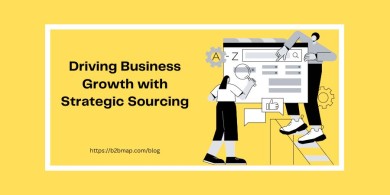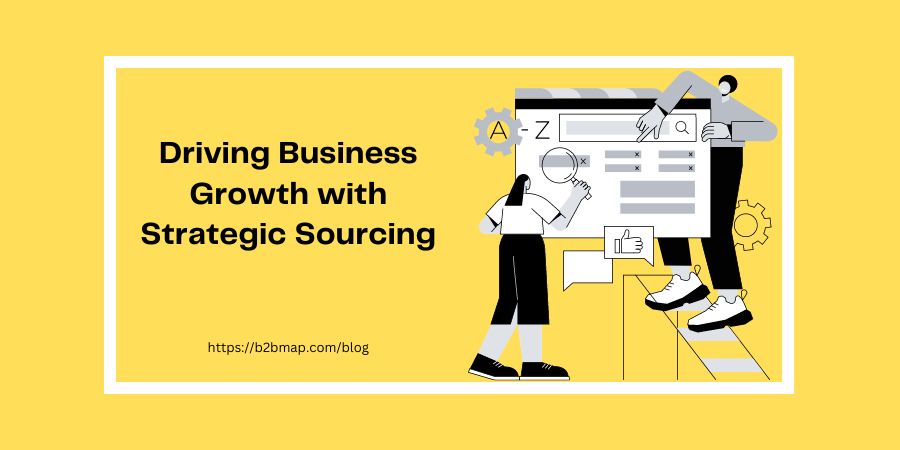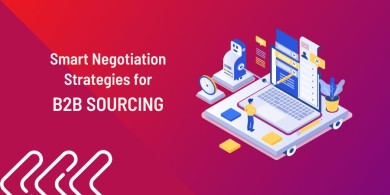
Are you looking to drive business growth and gain a competitive advantage in today's fast-paced market? Strategic sourcing is one of the key to staying ahead of the curve. In this article, we will explore how strategic sourcing can help businesses optimize costs, foster supplier collaboration, and mitigate risks. Whether you're sourcing from B2BMAP or other b2b platforms, understanding the importance of strategic sourcing and leveraging tools like "post buy requirement" can significantly impact your business success.
In a rapidly evolving business landscape, it's essential to adopt a proactive approach to procurement and supply chain management. Strategic sourcing goes beyond traditional purchasing practices, allowing businesses to make informed decisions, negotiate favorable terms, and build strong supplier relationships.
If you're sourcing from international b2b marketplaces, strategic sourcing can help you identify the right suppliers, evaluate their capabilities, and negotiate competitive pricing. Moreover, leveraging optionslike "Post Your Buy Requirement" enables you to communicate your specific needs and attract potential suppliers who can meet those requirements.
By embracing strategic sourcing practices, businesses can achieve cost optimization, enhance operational efficiency, and drive business growth. Moreover, supplier collaboration becomes a powerful tool to foster innovation and gain a competitive edge in the market.

In this article, we will go through the benefits of strategic sourcing, including cost optimization, supplier relationship management, risk mitigation, operational efficiency, and market insights. We will also provide practical strategies for successful strategic sourcing, including supplier evaluation, contract negotiation, data analytics integration, and continuous improvement.
Stay ahead of the curve by harnessing the power of strategic sourcing. Let's explore how this approach can propel your business forward and ensure long-term success.
Understanding Strategic Sourcing
Definition and Scope of Strategic Sourcing:
Strategic sourcing is a comprehensive procurement strategy that involves evaluating, selecting, and managing suppliers strategically to optimize costs, enhance supplier relationships, and drive overall operational excellence. It encompasses various elements such as supplier evaluation, smart negotiation, contract management, and ongoing supplier performance monitoring.
The Evolving Business Landscape:
Today's business landscape is characterized by increasing market volatility, rapid technological advancements, and globalization. To navigate these challenges successfully, businesses need to adopt proactive strategies such as strategic sourcing. By doing so, they can adapt to market changes, minimize risks, and capitalize on growth opportunities.
The Benefits of Strategic Sourcing
Cost Optimization and Savings:
Strategic sourcing enables businesses to achieve cost optimization by leveraging economies of scale, negotiating favorable pricing terms, and improving supply chain efficiencies. For example, through strategic supplier partnerships and volume leverage, companies can secure discounts and reduced production costs, resulting in significant cost savings.
Supplier Relationship Management and Collaboration: Building strong and collaborative relationships with suppliers is essential for driving business growth. Strategic sourcing facilitates supplier collaboration, joint ventures, and innovation programs, allowing businesses to tap into specialized expertise and access innovative solutions. For instance, by collaborating with key suppliers, b2b businesses can co-create products, share market insights, and gain a competitive edge.
Risk Mitigation and Supply Chain Resilience:
Strategic sourcing plays a vital role in mitigating risks and ensuring supply chain resilience. By diversifying supplier networks, conducting thorough risk assessments, and implementing contingency plans, businesses can minimize disruptions and maintain continuity in the face of unforeseen events. For instance, during the COVID-19 pandemic, companies with diversified supplier bases were better equipped to handle supply chain disruptions.
Operational Efficiency and Process Improvement:
Efficient procurement processes and streamlined workflows are critical for enhancing operational efficiency. Strategic sourcing helps b2b businesses standardize processes, automate manual tasks, and implement continuous improvement initiatives. For example, by leveraging digital platforms and data analytics tools, companies can streamline procurement operations, reduce cycle times, and achieve greater efficiency.
Market Insights and Innovation:
Strategic sourcing provides access to market insights, emerging technologies, and industry trends. By closely collaborating with suppliers and monitoring market dynamics, businesses can identify new growth opportunities and drive innovation. For instance, by engaging suppliers in joint research and development projects, businesses can accelerate product development and introduce innovative solutions to the market.
Strategies for Successful Strategic Sourcing
Supplier Evaluation and Selection:
Thorough supplier evaluation is crucial for successful strategic sourcing. Businesses should assess suppliers based on criteria such as quality, reliability, financial stability, and alignment with b2b business objectives. Conducting requests for proposals (RFPs), supplier audits, and reference checks can help in selecting the right suppliers.
Contract Negotiation and Performance Management:
Strategic contract and smart negotiation strategies ensures favorable terms, pricing, and service level agreements. Ongoing supplier performance management, including the use of key performance indicators (KPIs) and regular performance reviews, helps businesses track supplier performance, identify improvement areas, and foster continuous improvement.
Data Analytics and Technology Integration:
Leveraging data analytics and technology is crucial for maximizing the effectiveness of strategic sourcing. By using data analytics tools, supplier performance dashboards, and supply chain management systems, businesses can gain actionable insights, identify trends, and make data-driven decisions. For instance, analyzing spend data can uncover cost-saving opportunities, while real-time supplier performance monitoring can help identify potential bottlenecks and areas for improvement.
Integrating technology solutions like artificial intelligence (AI), machine learning, and blockchain can further enhance strategic sourcing effectiveness. These technologies can automate processes, enable predictive analytics, and enhance transparency and traceability within the supply chain. For example, AI-powered demand forecasting can help optimize inventory levels, while blockchain can provide a secure and transparent platform for supplier collaboration and tracking product authenticity.
Continuous Improvement and Adaptability:
Continuous improvement is at the core of successful strategic sourcing. Businesses should strive to continually refine their sourcing strategies and adapt to changing market conditions. This includes regularly assessing supplier performance, benchmarking against industry best practices, and seeking feedback from key stakeholders.
Adapting to emerging trends and technological advancements is equally important. For example, as sustainability becomes a key consideration in procurement, businesses should incorporate environmental and social factors into their supplier evaluation criteria. Embracing new sourcing models, such as circular economy principles or collaborative sourcing platforms, can also contribute to staying ahead of the curve.
In conclusion, strategic sourcing is a game-changer for businesses aiming to achieve sustainable growth and maintain a competitive advantage. By optimizing costs, nurturing supplier relationships, mitigating risks, and enhancing operational efficiency, strategic sourcing opens doors to business growth opportunities.
To stay ahead of the curve, businesses should consider leveraging b2b platforms like B2BMAP for sourcing from a diverse range of suppliers. Additionally, utilizing features like Post Buy Requirement or Request for Quotation on B2BMAP allows b2b businesses to attract potential suppliers and expand their sourcing network effectively.
Embracing strategic sourcing as an ongoing practice. By continuously improving sourcing strategies, adapting to market changes, and prioritizing supplier collaboration, businesses can position themselves as industry leaders.
In summary, strategic sourcing is not only a pathway to cost optimization but also a catalyst for innovation, risk management, and supply chain resilience. By harnessing the power of strategic sourcing, businesses can unlock their full potential, achieve sustainable growth, and navigate the evolving business landscape with confidence.
Related Articles
Grow Your Business Online
Use Our Buyer Seller B2B Marketplace to Source Your Product or Increase Sells & Revenue by Getting New Buyers.
